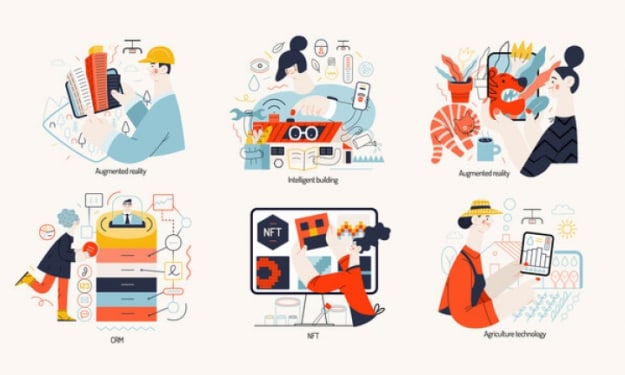The Revolution of NFT Music Marketplace Development: Empowering Artists and Transforming the Music Industry
NFT Music Marketplace Development

The music industry has long been a complex landscape for artists, with traditional models often favoring intermediaries over creators. However, the emergence of Non-Fungible Tokens (NFTs) has revolutionized the way artists can monetize their work and engage directly with their fans. In this blog post, we will explore the exciting world of NFT music marketplace development and how it is empowering musicians, transforming the music industry, and unlocking new avenues for creativity and financial success.
The Power of NFTs in the Music Industry
Non-Fungible Tokens (NFTs) are unique digital assets that can represent ownership or proof of authenticity for various types of digital content, including music. By tokenizing their music as NFTs, artists can create scarcity and exclusivity, allowing fans to own unique pieces of their favorite music. NFTs provide a transparent and decentralized platform for artists to monetize their creations, opening up new revenue streams and eliminating the need for intermediaries. Furthermore, NFTs can also be programmed to include smart contracts that enable artists to receive royalties automatically every time their NFT is sold in the secondary market, ensuring ongoing financial benefits.
The Rise of NFT Music Marketplaces
NFT music marketplaces have emerged as dedicated platforms that connect artists, collectors, and fans in a decentralized and transparent environment. These marketplaces provide a space for artists to mint and sell their music as NFTs directly to their audience, eliminating the need for traditional record labels and distributors. By leveraging blockchain technology, NFT music marketplaces ensure the immutability and authenticity of each music NFT, providing a trusted platform for both creators and collectors.
These marketplaces offer features such as bidding systems, instant purchases, and secondary market trading, allowing artists to engage directly with their fans and build a vibrant community around their music. Furthermore, they often provide additional functionalities, such as social features, live performances, and interactive experiences, enhancing the overall fan engagement and creating new ways for artists to monetize their creativity.
Benefits for Artists and Fans
a) Increased Autonomy: NFT music marketplaces empower artists to take control of their music careers. They can set their own pricing, retain ownership rights, and decide on the terms of sale for their NFTs. This newfound autonomy enables artists to earn a fair share of revenue and build a direct connection with their fan base.
b) Enhanced Fan Engagement: NFT music marketplaces create a unique and immersive experience for fans. Owning an NFT music piece allows fans to demonstrate their support for their favorite artists while enjoying exclusive perks, such as access to unreleased tracks, VIP experiences, and behind-the-scenes content. The direct interaction between artists and fans fosters a stronger sense of community and loyalty.
c) Transparent Royalties: The integration of smart contracts within NFT music marketplaces ensures transparent and automatic royalty distributions. Artists can earn ongoing royalties every time their NFTs are resold in the secondary market, providing a sustainable income stream that extends beyond the initial sale.
Development process of NFT music marketplace:
Developing an NFT music marketplace involves a comprehensive process that combines blockchain technology, smart contracts, user interfaces, and various functionalities to create a seamless platform for artists, collectors, and fans. Here is an overview of the development process:
Conceptualization and Planning:
The first step in developing an NFT music marketplace is to define the vision and goals of the platform. This involves conducting market research, identifying target users, and understanding the specific needs of artists and collectors within the music industry.
Technology Selection:
Selecting the appropriate blockchain technology is crucial for the development of an NFT music marketplace. Ethereum, for example, is a popular choice due to its robust smart contract functionality and extensive developer community. Other blockchain platforms such as Binance Smart Chain or Flow may also be considered based on specific requirements.
Smart Contract Development:
Smart contracts are the backbone of NFT music marketplaces as they govern the creation, ownership, and transfer of NFTs. The smart contract code should be developed to handle essential functionalities such as minting NFTs, handling royalties, managing ownership, and facilitating secondary market transactions. Solidity, a programming language used for Ethereum smart contracts, is commonly employed for this purpose.
User Interface (UI) and User Experience (UX) Design:
Designing an intuitive and visually appealing user interface is crucial to attract and engage users. The UI/UX design should focus on providing a seamless experience for artists to mint and list their music as NFTs, as well as for collectors to discover, purchase, and trade these NFTs. The interface should be responsive, accessible, and easy to navigate across different devices.
Backend Development:
The backend development involves building the infrastructure that supports the functionalities of the marketplace. This includes developing APIs for interacting with the blockchain, integrating wallets for secure transactions, implementing databases for storing metadata and transaction history, and setting up servers for scalability and performance.
Security and Testing:
Security is of utmost importance when dealing with digital assets and financial transactions. Extensive testing, including unit testing, integration testing, and security audits, should be conducted to identify and resolve any vulnerabilities or bugs. Additionally, rigorous testing of the smart contracts and their interactions with the marketplace should be performed to ensure the system's reliability and security.
Integration of Payment Gateways:
To enable the buying and selling of NFTs within the marketplace, integration with payment gateways is essential. This allows users to transact in cryptocurrencies or fiat currencies, depending on the platform's requirements and target audience. Integration with popular payment providers or the development of a custom payment solution can be considered.
Launch and Deployment:
Once the development and testing phases are complete, the marketplace is ready for deployment. It can be launched on the mainnet of the chosen blockchain platform, making it accessible to users. Ongoing maintenance and updates should be performed to ensure the platform remains secure, scalable, and up-to-date with the evolving needs of the users and the technology.
Community Building and Marketing:
Building a vibrant community around the NFT music marketplace is essential for its success. This involves implementing social features, facilitating interactions between artists and fans, and leveraging marketing strategies to attract both artists and collectors. Promoting the marketplace through partnerships, influencer collaborations, and targeted marketing campaigns can help generate awareness and drive user adoption.
The Future of NFT Music Marketplaces
As the NFT ecosystem continues to evolve, we can expect NFT music marketplaces to become even more sophisticated and diverse. The integration of additional features, such as augmented reality (AR) and virtual reality (VR) experiences, will create immersive and interactive environments for fans to explore music in entirely new ways. Collaborations between artists, collectors, and even brands will further expand the possibilities, allowing for innovative partnerships and unique creations.
Conclusion
NFT music marketplace development has ushered in a new era for artists, enabling them to reclaim control over their music and connect directly with their fan base. Through the power of NFTs and blockchain technology, artists can monetize their work, foster deeper engagement, and create a sustainable income stream. As the music industry continues to transform, NFT music marketplaces are poised to revolutionize the way music is created, shared, and experienced, providing a platform that celebrates creativity, empowers artists, and enriches the music ecosystem as a whole.
About the Creator
Jhonmatthew
I am a Web 3.0 Analyst who writes about blockchain, crypto, NFTs, DeFi, etc., that will let you know the latest advancements circling over the Web 3.0 space.






Comments
There are no comments for this story
Be the first to respond and start the conversation.